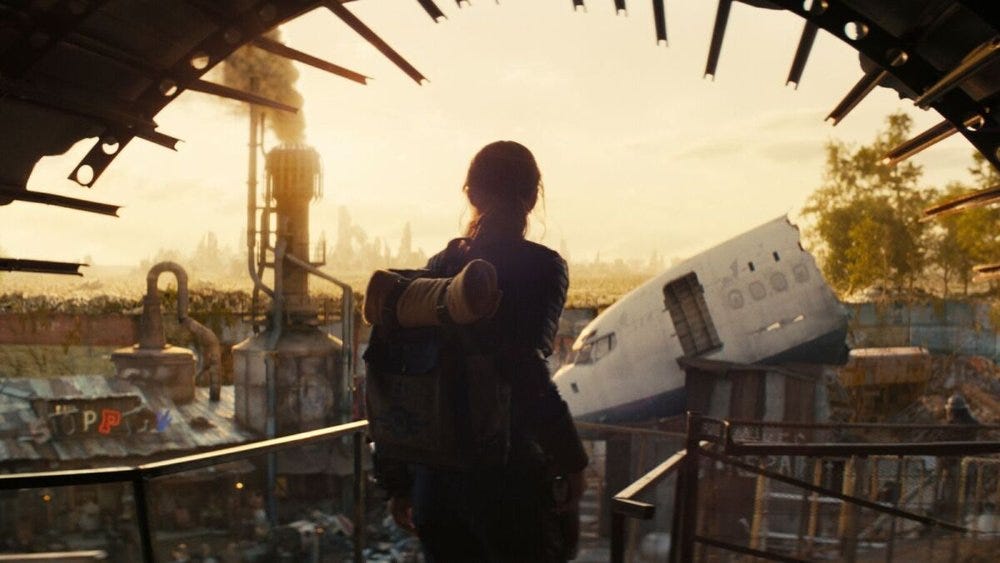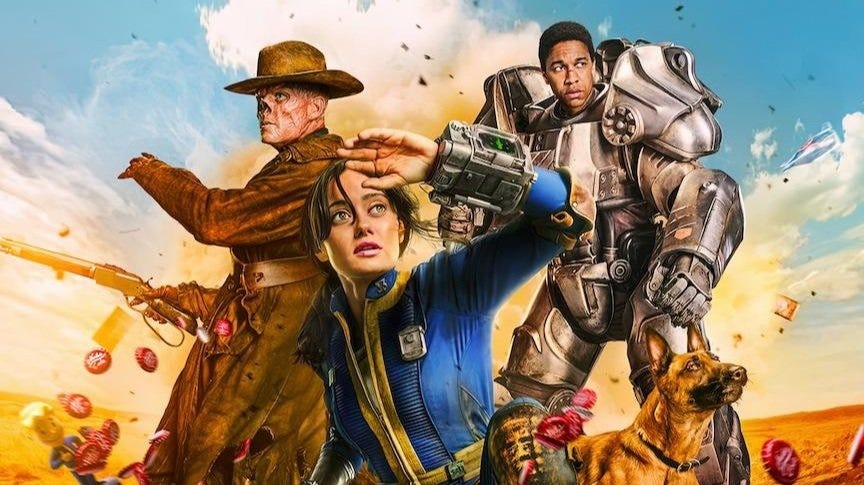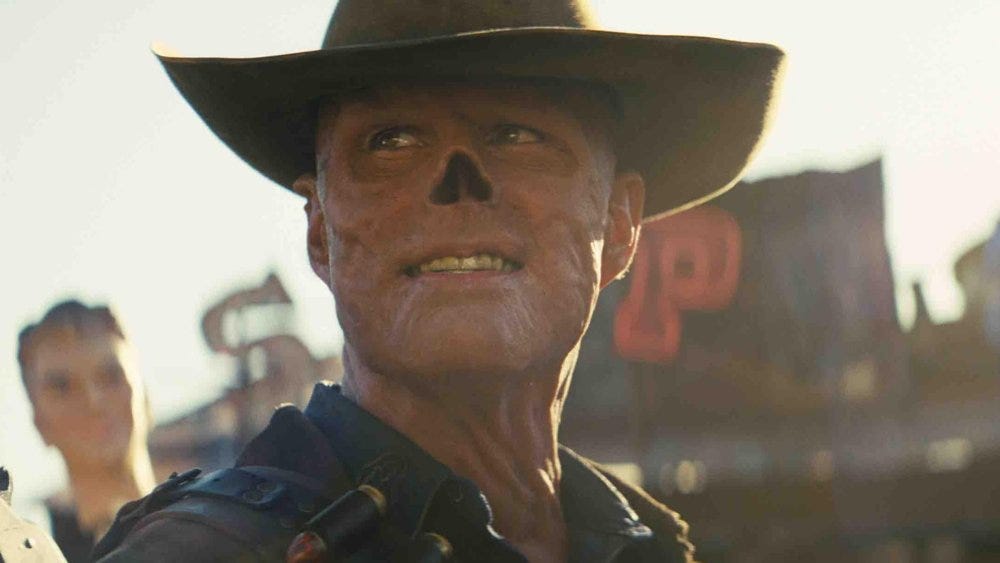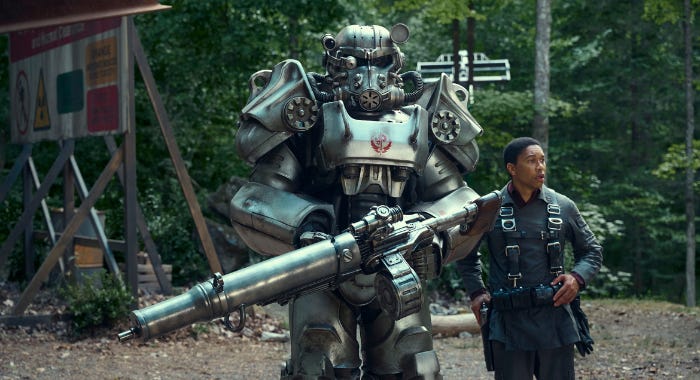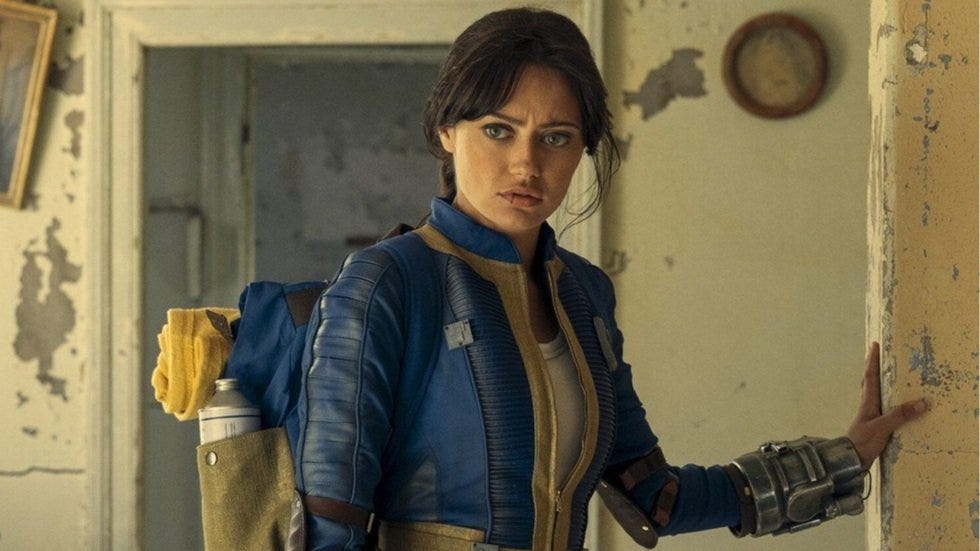Prime Video’s ‘Fallout’ (2024) Annihilates All Expectations
[Everyone Liked That]
In a future, post-apocalyptic Los Angeles brought about by nuclear decimation, citizens must live in underground bunkers to protect themselves from radiation, mutants and bandits.
— Official Synopsis
Fallout has captivated audiences for decades with its immersive world-building and thought-provoking narratives set in a post-apocalyptic wasteland. The recent transition from video game to a TV show adaptation marked a significant milestone for the franchise, promising to bring the rich tapestry of the universe to life on the small screen. Let’s explore the evolution of Fallout from its origins as a game series to its adaptation as a character-driven TV show—and what Prime Video managed to get right [with near perfect accuracy].
The concept of Fallout emerged from the creative minds at Interplay Entertainment in 1997, introducing players to a world devastated by nuclear war. The original game set the stage for a series known for its dark humor, moral choices, and retro-futuristic aesthetics. As the franchise evolved, so too did its roster of characters, each with their own stories, motivations, and conflicts. The focus on bringing more even more choice and power to the player became a cornerstone exercise in this devastated sandbox from publisher Bethesda Game Studios. The evolution from the very first Fallout to the likes of Fallout 4, and even the controversial release of Fallout 76, has been fascinating to experience from a fan’s perspective. Yet, the series remains popular for gaming enthusiasts and newcomers alike. I would consider myself a casual fan, yet I can confidently say that some of the most special gaming moments for me have happened in the world of Fallout.
The franchise has always placed a strong emphasis on character development, allowing players to shape the fate of their protagonist and interact with a diverse cast of NPCs (non-playable characters). From companions to adversaries, these characters play a crucial role in shaping the player's journey through the wasteland. However, the true magic of the game series lies in the perspective of the player. How does the gamer respond to their surroundings and changing environmental threats? Well, the choice is [mostly] up to them. And so, Prime Video and series showrunners Geneva Robertson-Dworet and Graham Wagner needed to successfully convey the franchise’s unique tone all while crafting a narrative resonance for viewers new to the property.
Transitioning to television presented an opportunity to delve even deeper into the lives and motivations of these characters; and by extension, an opportunity to flirt with the different iterations of play-styles from the games, themselves. The Fallout TV show introduces new protagonists while also reimagining fan-favorite characters or moments from the games. From the enigmatic lone survivor to the morally ambiguous faction leaders, each character is given the opportunity to shine and undergo meaningful arcs of growth and development. The showrunners crafted three protagonists that embody elements familiar to long-time players, each of whom navigate the radioactive desert in a different capacity—much like how players would make wholly different decisions in-game.
From a naive vault dweller, to a hardened outlaw, and a lowly squire, there’s no shortage of interesting plot. Ella Purnell plays Lucy MacLean, a happy-go-lucky citizen of Vault 33; born and raised in the vault, her attitude is one of rainbows and butterflies [especially comparative to the surface dwellers]. Purnell’s performance gushes with objective morality—which can be both sheepish and unapologetically cute. Lucy’s story existing in a pseudo-normalized environment clashes with the reality of the world outside of her bubble. On the other side of the coin there’s The Ghoul. Walton Goggins is especially fascinating to watch as his path is laid before the audience as a warning that Lucy could end up being corrupted the just the same. Once a Hollywood star, Cooper Howard (Goggins) has perhaps the most thematic resonance: a true family man whose morality leads to a devastating point of no return. Or, simply just a carbon-copy of a player who unleashes a bullish mania into the barren lands.
Then, there’s Maximus played by Aaron Moten—who singlehandedly has my favorite line of the entire show. I quite literally spit out my drink during this interaction. As a member of the Brotherhood, his environment is just as harsh as everybody else’s on the surface. Being a pawn in a larger political game, Maximus must gain the courage to overcome his adversaries and demand a level of ownership for this destiny; he is written in such a way that resembles a player who has been thrust into this hell-scape and is learning that he has more autonomy that he previously thought possible. In many ways, though, he is the tritagonist, secondary to both Lucy and The Ghoul. Whether it seems as such, there is a tangible RPG element to these characters and the way in which they represent different styles of role-playing.
At the heart of the show are the intricate dynamics and relationships between these characters and where their paths may cross. Whether forging alliances, facing off against enemies, or navigating the complexities of the wasteland, these interactions drive the narrative forward and provide insight into the human condition in extreme circumstances. And the best part? The showrunners found a way to engage the audience with even more heart than anticipated; radiating a unwavering love for the franchise. Finding Moldaver (Sarita Choudhury), the series big-bad, serves as the main quest for Lucy, but there’s so much fun to be had along the way that the show perfectly encapsulates what it’s like to get sidetracked in the game. Often times, the side quests are much more enjoyable anyways—and it certainly is in the show. From ruthless warlords to charismatic cult leaders, the world is populated by a colorful cast of characters with their own agendas and ambitions.
For example, I could have cared less about the politics of the vault dwellers. However, I was quickly convinced that there’s a interesting story to be told through the perspective of Norm (Moises Arias). How can Betty (Leslie Uggams) be so sweet and menacing?
If you would have told me that Prime Video’s Fallout would be able to trap the spirit of the games while delivering a tender exploration of character and morality, I would have laughed. However, breaking through the performances and tonal wittiness there is an abundance of immersive drama. But its greatness shouldn’t be measured only by the quality of writing and acting, the actual story structure and layering technique to slowly unravel Vault-Tec’s sinister product was satisfying for someone with a handful of knowledge about the lore itself. Flashbacks are [often] a tired way to perfectly center exposition for audience’s digesting new or revealing information; yet, I was consistently engaged with both the past and present.
Fallout doesn’t tick every box on this fanboy’s wishlist, though. Sure, the show handles the Pip-Boys, health packs, and other in-game elements with ease but where are the super mutants? Los Angeles is the center of the narrative, after all, and The Enclave exists here [ignore the lore timeline]. Let’s also talk about the Shady Sands problem. If New Vegas takes place after the show’s current timeline and Shady Sands was very much alive and well under the New California Republic (NCR), why has the town been decimated by another hydrogen bomb? These are questions that either will be revealed in Season 2 or have been entirely ignored for the series. Still, it’s a largely faithful adaptation and most fans would agree. But what’s up with the binge release strategy? The series could have benefitted greatly from a weekly release strategy. I nearly avoided watching any of it as I was roughly a week behind everyone else who had finished already.
Seeing as my social media feeds were nothing but Fallout memes for a straight week, I was persuaded to check it out and was even tempted to re-download a few of the games. Speaking of: since its debut, the Steam numbers for Fallout 76 have reached an all-time high. Fallout 4 was even able to reach an eight-year peak shortly after the release of the show. It’s no surprise then, Fallout has been renewed for a second season with Prime Video. The series has left a lasting impact on audiences, thanks in large part to its richly drawn characters and compelling performances, especially from Purnell and Goggins. Viewers have become emotionally invested in the fates of their new favorite characters, and the momentum has been harnessed for a successful, long-running adaptation—unlike another popular game adaptation we know that rhymes with Master Beef...
Prime Video’s adaptation stands as a testament to the enduring appeal of character-driven drama in the post-apocalyptic genre. With its richly drawn cast, intricate relationships, and thought-provoking themes, the show offers a compelling exploration of humanity in extreme circumstances. It serves as the perfect extension of an RPG-style narrative with its positioning of the three leads and playful journey. As Fallout continues to evolve for the silver screen, one thing remains clear: in the wasteland, it is the characters who truly define the story, their actions shaping the fate of the world around them. And unlike playing in the giant, radioactive sandbox ourselves, we have no control.
Check out the full first season on Prime Video.




